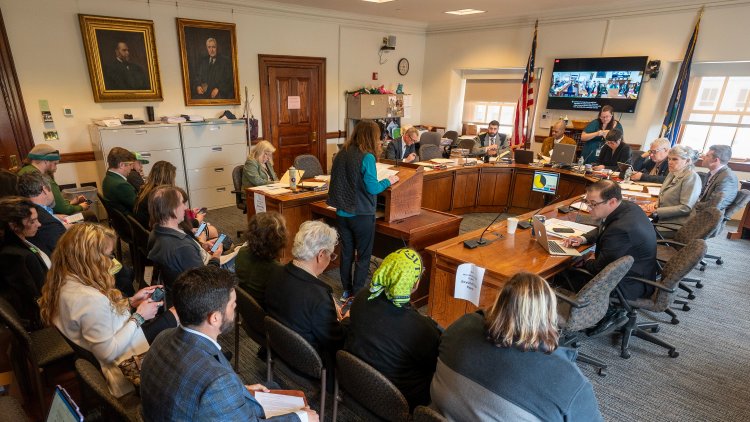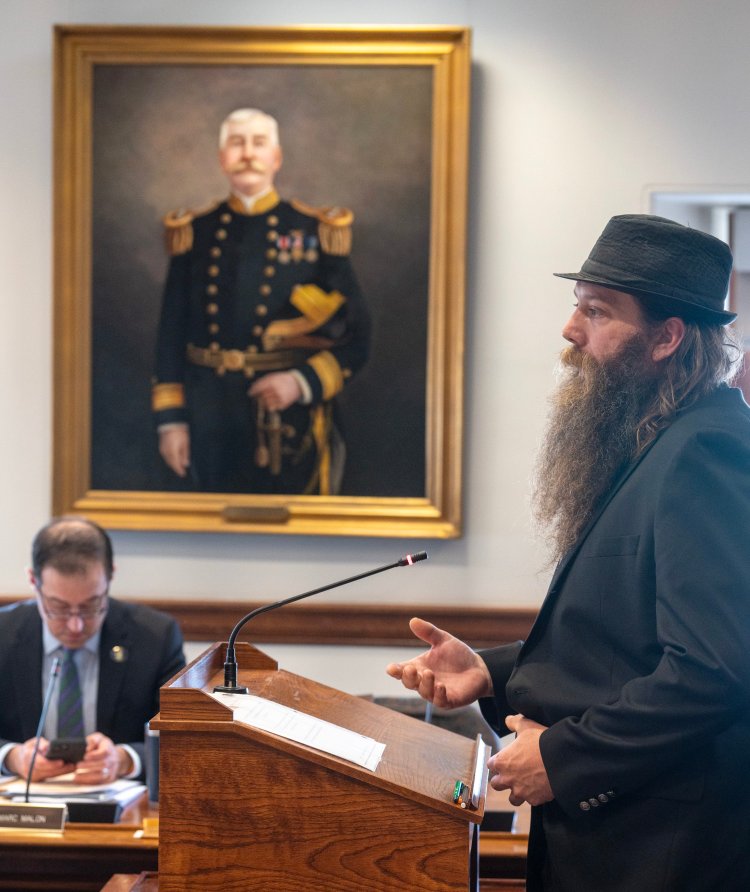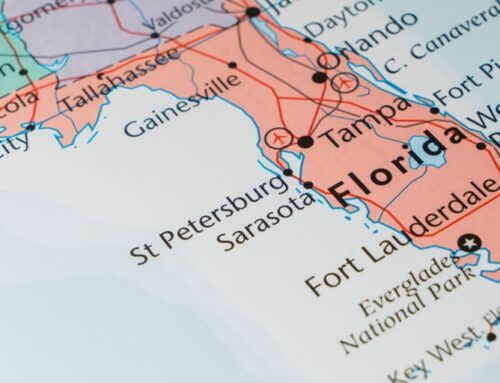Medical cannabis industry organizes against Maine proposals to test for mold, track plants
May 5, 2025

The Legislature’s Veterans and Legal Affairs Committee hears testimony on cannabis bills Monday in a fourth-floor hearing room at the Maine State House in Augusta. Joe Phelan/Kennebec Journal
AUGUSTA — Maine’s recreational cannabis market requires products and plants to be tested for mold, yeast, pesticides, fertilizers, heavy metals and more. The medical marijuana industry does not.
Lawmakers heard testimony Monday on two bills that seek to change that, but both face an uphill battle against the industry.
LD 104, proposed by the state’s Office of Cannabis Policy and sponsored by Rep. Marc Malon, D-Biddeford, would require seed-to-sale plant tracking and standardize chemical, mold and heavy metal testing between recreational and medical cannabis. LD 1847, sponsored by Rep. Anne Graham, D-North Yarmouth, seeks to do the same while also adding potency caps on cannabis edibles.
Proponents argue the bills will improve the quality of Maine cannabis and protect consumers.
“Whenever I speak with ordinary Mainers, folks not involved in politics and not involved in the cannabis industry, they are stunned to hear that medical cannabis isn’t subject to the kinds of testing standards as adult use. If anything, they expect the reverse to be true,” Malon said.
“If current and future cannabis consumers are not confident in the quality of cannabis available legally in Maine, it puts the entire industry at risk,” he added.
Several dozen medical cannabis caregivers and consumers, however, testified in opposition to both bills — many at the urging of industry groups and lobbyists. They argued that adding regulations would make growing more expensive, raise costs for consumers and contribute to what many see as the corporate consolidation of the state’s medical market.
“While these may seem like commonsense safeguards, they present major financial and operational challenges to small, local caregiver businesses,” said Jennifer Belcher, president of the Maine Cannabis Union Association. “These are not large-scale operations. They are everyday Mainers.”

Marijuana that failed test results is shown at Earth Keeper Cannabis in Winthrop on Oct. 16. Maine’s medical marijuana program is rife with contaminated cannabis, and a 2023 report showed that almost half of the cannabis sold in the medical market would fail the standards set for the recreational market. Rich Abrahamson/Morning Sentinel
Only a handful of people spoke in support of testing. One was John Brady, who co-founded the recreational cannabis company Brilliant Buds in Auburn. He said although a mandate would be cumbersome, he believes the process is important to ensure consumer safety.
Brady cited a 2023 report by the Office of Cannabis Policy that found about 43% of the cannabis in Maine’s medical market would fail the standards set for the recreational market and noted that cannabis is a bioaccumulator, meaning the plant stores and holds on to all the chemicals, microbes and contaminants in the air, water and soil during its entire life cycle — making testing even more important.
“While we hate having to pay all the money for track and trace, for the excise tax and for testing, it’s a necessary part of doing business,” Brady said before the hearing. “If a doctor told you, ‘I’m going to prescribe this medicine, but by the way, 43% of this medicine fails for dangerous off-label pesticides, or molds, or whatever,’ you probably wouldn’t take that medicine.”
The Office of Cannabis Policy has issued three recalls to date of recreational cannabis for mold contamination. Opponents of the bill have said the recalls are examples of the testing regime’s flaws. Brady said it shows the system working as intended to keep tainted product off shelves.
Opponents of the bills believe the legislation stands to protect large cannabis businesses more than their consumers.
Matt Bayliss, founder of cannabis company Garden of Gele, transitioned his business from the recreational to medical market because of what he describes as the overregulation of Maine’s recreational cannabis market.
“This isn’t about public health and safety. It’s about market consolidation and limiting Maine’s small cannabis operators, the very people that built this industry from the ground up,” he told lawmakers.
Unlike most states, Maine’s medical cannabis market has always outperformed its recreational counterpart, bringing in about $280 million in 2023. Partly because of the less stringent regulations, medical cannabis is often cheaper than recreational cannabis for Maine consumers.

Kyle Abbott testifies Monday as the Veterans And Legal Affairs Committee hears testimony on cannabis bills at the Maine State House. Joe Phelan/Kennebec Journal
Many who spoke Monday attributed Maine’s uniquely strong medical market to the industry’s less stringent regulations and guidelines.
“These bills would impose layers of regulatory burden with no evidence of public benefit, creating cost and compliance issues that small operators simply can’t sustain,” said Leo Paquette, founder of medical cannabis company Firefly Organics and recreational dispensary Fire on Fore.
POLITICAL SUPPORT
Several individuals and organizations who testified against the bills, including Paquette, have donated hundreds or thousands of dollars to the committee’s chair, Sen. Craig Hickman, D-Winthrop, and its ranking member, Rep. David Boyer, R-Poland. In the 2024 cycle, donations from the cannabis industry made up about a third of Hickman’s campaign cash and more than half of Boyer’s.
Both lawmakers have been staunch opponents of regulating medical cannabis and have each proposed and sponsored legislation to roll back licensing requirements, purchasing limits and other regulations. Boyer also is mounting an effort to oust the Office of Cannabis Policy’s director, John Hudak, over alleged conflicts of interest with the company contracted to track the state’s recreational plants.
Hudak testified virtually before the committee Monday, speaking in favor of both Malon and Graham’s bills. He said dispensary owners around the state have reported an influx of suspected illegal growers allegedly associated with Chinese organized crime selling bulk cannabis at “rock bottom” prices to legal dispensaries.
“It’s time to stop debating whether or not there’s a need for mandatory contaminant testing in Maine’s medical cannabis program. There is,” Hudak said.
REVOKING It’s much easier to become a licensed caregiver in Maine than in most other legal states. Under current regulations, caregiver licenses cannot be revoked for growing or selling tainted cannabis, using toxic chemicals or pesticides or operating in an unsafe environment. Most license revocations occur because caregivers are growing too many plants or not maintaining their sales log.
As a result, hundreds of once-illegal cannabis grow houses allegedly run by Chinese organized crime have navigated Maine’s loose legal framework to become legal medical caregivers, even in several properties previously raided by police.
Black mold infestations, toxic chemical pesticides and black market fumigants imported from China have been found inside the majority of illegal grow houses raided by local and federal authorities so far. Potentially fatal amounts of toxic chemicals have been found inside cannabis grown at multiple licensed grow houses.
“Absent inventory tracking, there’s no way for regulators to know the origin of medical cannabis offered for sale to qualifying patients,” Hudak told the committee. “It’s time to put the safety and informed consent of Maine patients first.”
Search
RECENT PRESS RELEASES
Related Post




